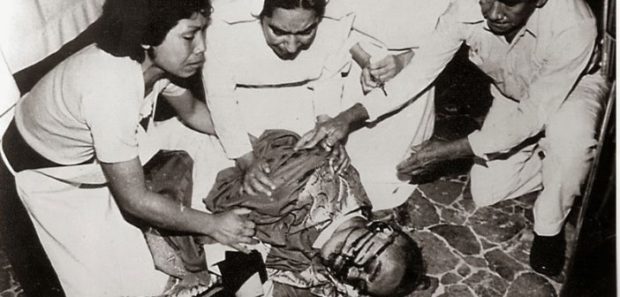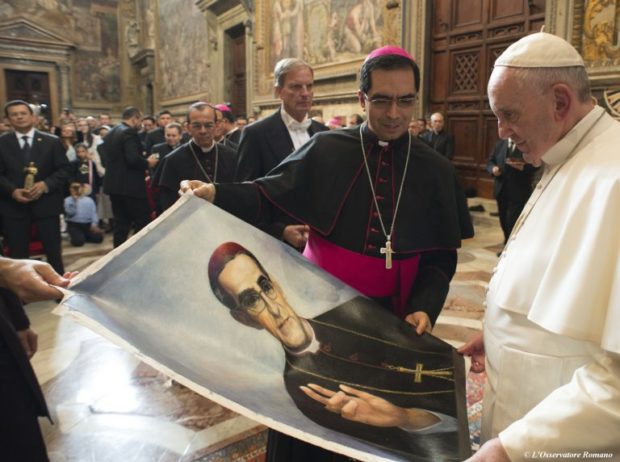
Supporters grieve over assassinated Bishop Oscar Romero in El Salvador.
He was a priest from a small faraway Central American country, thousands of miles from the Philippines. But in the 1980s, during the dictatorship of Ferdinand Marcos, Oscar Romero’s story resonated among many Filipinos of my generation.
On Sunday, Pope Francis proclaimed him a saint. As the Philippines reels from another time of repression under Rodrigo Duterte, it’s an opportune time to remember the brave Salvadoran archbishop who had the guts to tell soldiers who were killing his people: “I order you in the name of God: Stop the repression!”
El Salvador was in the grips of a brutal military dictatorship when Romero became a fierce critic of the Salvadoran military, which was waging campaign of slaughter, akin to today’s killings in the Philippines under Duterte.
On March 23, 1980, in the face of threats and despite warnings that he should just stay silent, Romero gave one of the most powerful sermonsin history. The last part is worth quoting in full:
“I would like to appeal in a special way to the army’s enlisted men, and in particular to the ranks of the National Guard and the police — those in the barracks. Brothers: you are of part of our own people. You kill your own campesino brothers and sisters. Before an order to kill that a man may give, God’s law must prevail: Thou shalt not kill!
“No soldier is obliged to obey an order against the law of God. No one has to fulfill an immoral law. It is time to take back your consciences and to obey your consciences rather than the orders of sin. The Church, defender of the rights of God, of the law of God, of human dignity, of the person, cannot remain silent before such abominations. We want the government to understand seriously that reforms are worth nothing if they are stained with so much blood.
“In the name of God, and in the name of this suffering people, whose laments rise to heaven each day more tumultuous, I beg you, I beseech you, I order you in the name of God: Stop the repression!”
The next day, as Romero was saying mass on March 24, 1980, an assassin opened fire at the altar where the archbishop was standing. Romero was raising the consecrated bread and wine when he was shot in the heart, according to The Atlantic.
The assassination was dramatized in the movie “Romero”starring Raul Julia.

Pope Francis with the image of newly canonized St. Oscar Romero. AP PHOTO
In the Philippines, activist priests and nuns played important roles in the fight against Marcos. Some of them — Father Rudy Romano, Father Nilo Valerio, Father Frank Navarro — became martyrs of the struggle against fascist rule. Sadly today, others ended up becoming allies and enablers of Duterte.
But many others have kept on fighting — even if it means suffering and death.
Last December, Father Marcelito Paez, known simply as Father Tito, a veteran of the anti-Marcos struggle, was gunned down in Nueva Ecija. His death signaled the start of a wave of violence against clergymen who were speaking out against the Duterte killings.
Recently, Duterte confessed: “My only sin is the extrajudicial killings.” But the pronouncement was nothing more than an act of arrogance than a vow to end the slaughter.
That makes Saint Oscar Romero’s story even more relevant to Filipinos today. As the Duterte killings continue, one of Oscar Romero’s famous quotes is worth highlighting for Filipinos:
“Peace is not the product of terror or fear. Peace is not the silence of cemeteries. Peace is not the silent result of violent repression. Peace is the generous, tranquil contribution of all to the good of all. Peace is dynamism. Peace is generosity. It is right and it is duty.”
Visit the Kuwento page on Facebook.

